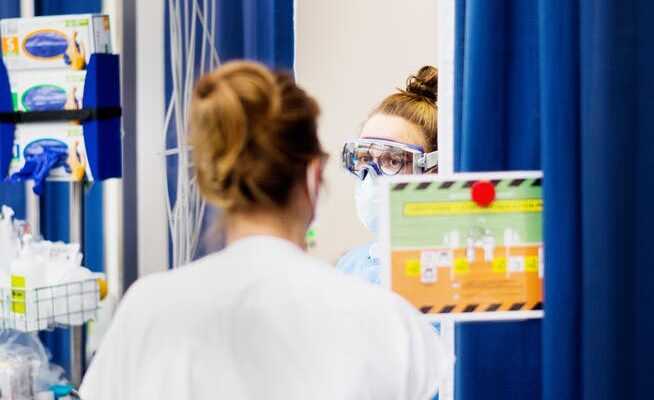During the pandemic, the university hospitals were faced with the treatment of Covid patients. However, the directors of the five university hospitals say that their services are not sufficiently paid for. And the reforms planned by politicians would make the situation worse.
The university hospitals emerge from the pandemic with a deficit: Operation in an emergency at the University Hospital Zurich under corona conditions.
Uwe Jocham, President of the Insel Group, received positive news on Tuesday morning. For the first time in more than two years, there were no Covid patients in the two intensive care units (ICU) at Bern University Hospital. The joy was short-lived, however. Another patient with Covid symptoms came to the IPS in the afternoon. This anecdote sums up the message from the directors of the five Swiss university hospitals. You are far away from the stress of the peaks of the respective corona waves, but the pandemic is not over yet.
On Thursday, the hospital managers highlighted the performance of their hospitals for the entire healthcare system in front of the media. Without the university hospitals, Switzerland would have weathered the pandemic far worse, said Werner Kübler, director of the University Hospital Basel. Purely because of their size, the university hospitals would have looked after a large number of Covid patients. With 41 percent of the treated Covid cases, they bore the brunt. In addition, research and the knowledge gained about Covid disease were also an important resource that was passed on to smaller hospitals, said Kübler. The burden also meant that specialized staff from other fields had to be called in for corona patients and was therefore lacking in the respective fields.
“Now we’re all under water”
The directors do not praise the work of their houses as an end in itself. It’s about tangible financial interests. The additional services provided by the university hospitals are recognized, but paid too little. In the two years of the pandemic, the five hospitals had additional expenses of CHF 352 million for staff and material costs. The loss of income due to postponed interventions amounts to CHF 250 million. The location cantons compensated for a large part of the loss. Nevertheless, the university hospitals made a cumulative loss of CHF 80 million.
Before the pandemic, two university hospitals were still just in the green, said Kübler – in relation to the costs covered by basic insurance. “Now we’re all underwater.” And the prospects are also unfavourable. The hospital managers are concerned about various reforms and savings efforts. Some of the costs incurred are not covered. The new tariff for outpatient treatment (Tardoc) that has been submitted to the Federal Council but has not yet been approved will probably not worsen the financial situation, but it will not improve it either.
The doctors’ association FMH and the health insurance association Curafutura, who negotiated the Tardoc, see this differently. There is a shift from specialists to generalists, namely paediatricians, said Curafutura director Pius Zängerle. But the hospitals were also among the winners. Calculations showed that university hospitals could expect additional income of up to 4.5 percent in the outpatient sector. In the university children’s hospitals it is even up to 20 percent.
In the inpatient area, according to the hospital directors, the insurers are putting pressure on the remuneration. Because they are dealing with more difficult cases, the treatments in the university hospitals are paid more than in other clinics. This must also be reflected in the tariffs.
University hospitals also have to save
Politicians are also concerned about the cost increases in the healthcare system. The cost brake initiative from the center and a counter-proposal from the Federal Council are pending in parliament. This provides targets for the development of healthcare costs. The FMH fears that services would be rationed. Jocham is also very critical of this reform. This intervention could further aggravate the overall situation in the university hospitals, he said on the sidelines of Thursday’s event.
No player in healthcare likes to save. But why should the university hospitals of all things be spared from austerity efforts? According to industry experts, the pressure to save is also forcing university hospitals to review their cost structures. This could lead to cutbacks in areas where university hospitals are not competitive. This includes basic services.
“We live economy and are not against cost savings,” said Jocham: “But we must not save unilaterally”. The services of the university hospitals should be paid fairly. Their special position in the healthcare system should be preserved.
According to Jocham, the new individual service tariff Tardoc and flat rates would eliminate false incentives in the outpatient area. The introduction does not necessarily have to take place at the same time. Since the Tardoc has already been worked out and submitted to the federal government, he hopes it will be implemented quickly, said Jocham. The beginning of 2024 is realistic. The Federal Council is expected to decide on the approval of the Tardoc before the summer break.
